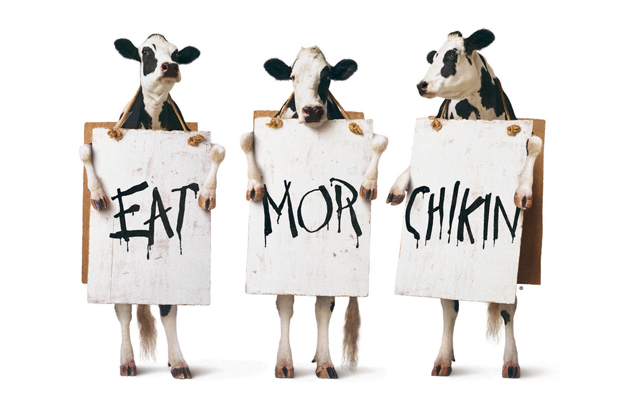
"If it's red and dead—then you're well fed"
"Eat Beans not beings; give peas a chance!"
Should Christians eat meat, or just vegetables? It's a more complex question than you might think at first glance, and one we give our attention to during National Vegetarian Week.
There has been growing concern about a whole variety of issues which should rightly affect the way Christians think about this question.
While all these factors should cause us to ponder the situational rightness of eating meat, it is wrong to make this an absolute command, for the simple reason that it is nowhere specifically commanded in the Bible.
Eden food
In Genesis before the fall, God gave Adam and Eve the responsibility of caring for the Earth. He specifically gave them plants and vegetables to eat.
Then God said, "I give you every seed-bearing plant on the face of the whole earth and every tree that has fruit with seed in it. They will be yours for food. And to all the beasts of the earth and all the birds of the air and all the creatures that move on the ground—everything that has the breath of life in it—I give every green plant for food." And it was so. God saw all that he had made, and it was very good… Genesis 1 v 29-31
But after the fall, the first man and woman are first given animal skins to wear—a sign of both God's compassion for them and of the consequences of their sin for the whole of creation. Some also see this act as an indication that humanity's nurture—and ultimately our redemption—will come through the death of another. After the flood, God specifically gives humanity permission to eat meat (Genesis 9 v 2-3). This permission has never been overridden, but neither has the command to responsibly care for the creation with the same kindness, love and intelligence as our creator.
Until the new creation, eating meat is a good thing to do—although it should remind us that we live in a fallen world; that death is part of the way we are physically sustained.
Jesus was not a vegetarian. The Bible records Jesus eating fish and lamb. Jesus miraculously fed the crowds fish and bread. In a vision to the apostle Peter, Jesus declared all foods to be clean, including animals (Acts 10 v 10-16).
So until the new creation, eating meat is a good thing to do—although it is a practice which should remind us that we live in a fallen world; that death is part of the way we are physically sustained.
New creation food
What will we eat in the new creation? The natural assumption would be that Eden restored will again be vegetarian. John's vision of what is to come seems to confirm this. He saw:
The river of the water of life, as clear as crystal, flowing from the throne of God and of the Lamb down the middle of the great street of the city. On each side of the river stood the tree of life, bearing twelve crops of fruit, yielding its fruit every month. And the leaves of the tree are for the healing of the nations. No longer will there be any curse. Revelation 22 v 1-3
The thought of a vegetarian new creation might well sound uninviting to you! The idea certainly brought no pleasure to one South African at The Good Book offices. It's hard to convince Dex that Chicken is meat—he routinely classifies it as a vegetable—so the thought of a steakless eternity does not particularly appeal. But the truth of the matter is that we just don't know...
So what for now?
Until then, Christians are free to enjoy meat as a gift from God to be received with thanksgiving (1 Timothy 4 v 3). With that said, there is nothing wrong with a Christian being a vegetarian either. The Scriptures do not command us to eat meat. And there is nothing wrong with abstaining from eating meat. What the Bible does say is that we should not force our convictions about this issue on other people or judge them by what they eat or do not eat.
One person’s faith allows them to eat anything, but another, whose faith is weak, eats only vegetables. The one who eats everything must not treat with contempt the one who does not, and the one who does not eat everything must not judge the one who does, for God has accepted them. Romans 14 v 2-3
Do any of you feel guilty, angry or very strongly about this question?
Do start a conversation about it below—bearing in mind the verses you have just read...
Kip' Chelashaw
I have quibbles about your approach... I am not sure that the best way to decide on whether something is right or wrong is merely by looking for commands or prohibitions in Scripture. Where for example in Scripture do we get given the command to have sermons in our gatherings? Or the command to believe in the Trinity? Or penal substitutionary atonement? Yet I would argue that these are all right and true and should be believed.
Re food and what we'll eat in glory, have you considered how Isaiah 25:6-8 fits into the mix? This is a passage that seems to describe the celebration believers will enjoy in the new heavens and new earth (given the destruction and cessation of death) and it looks very much like the menu will include some exquisite filet mignon accompanied by a vintage chateauneuf du pape!